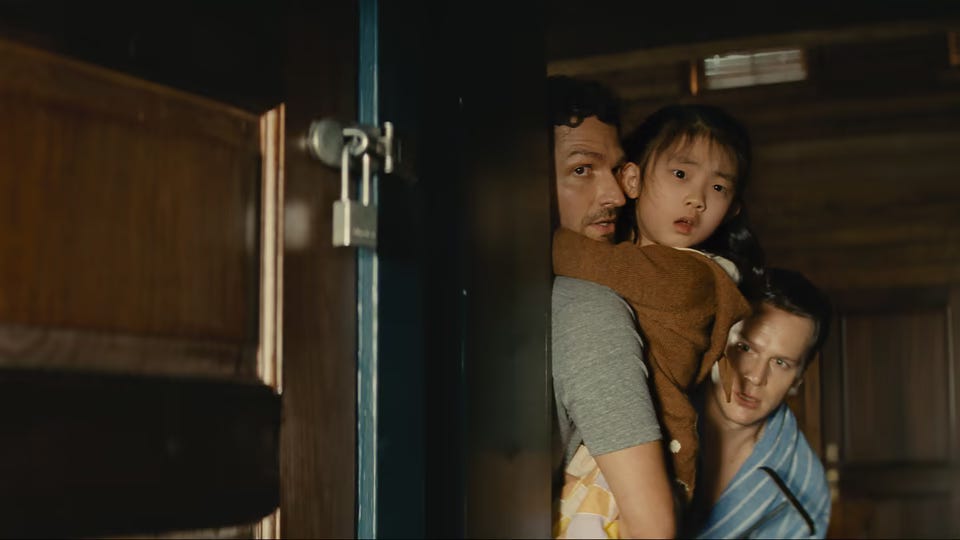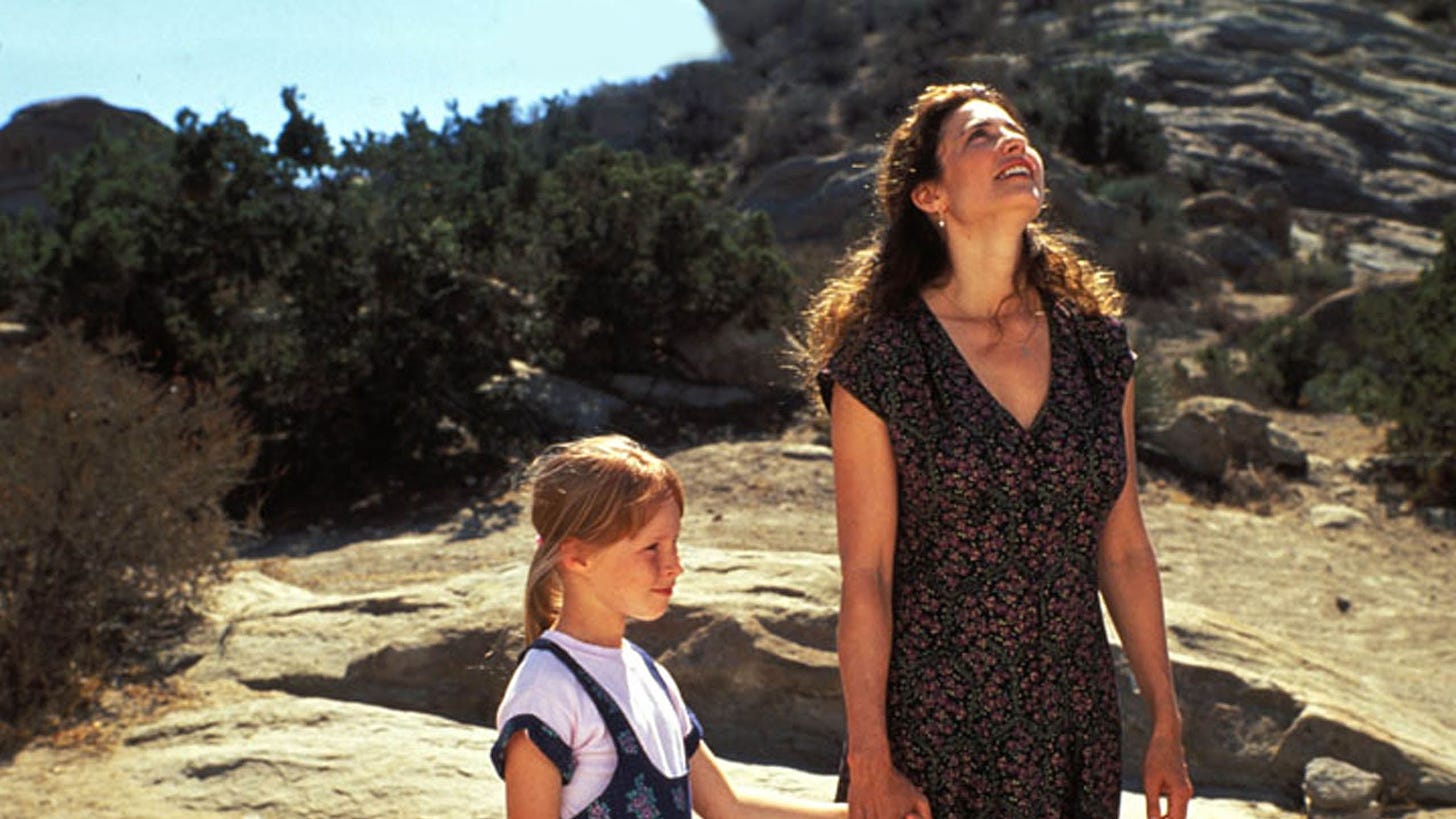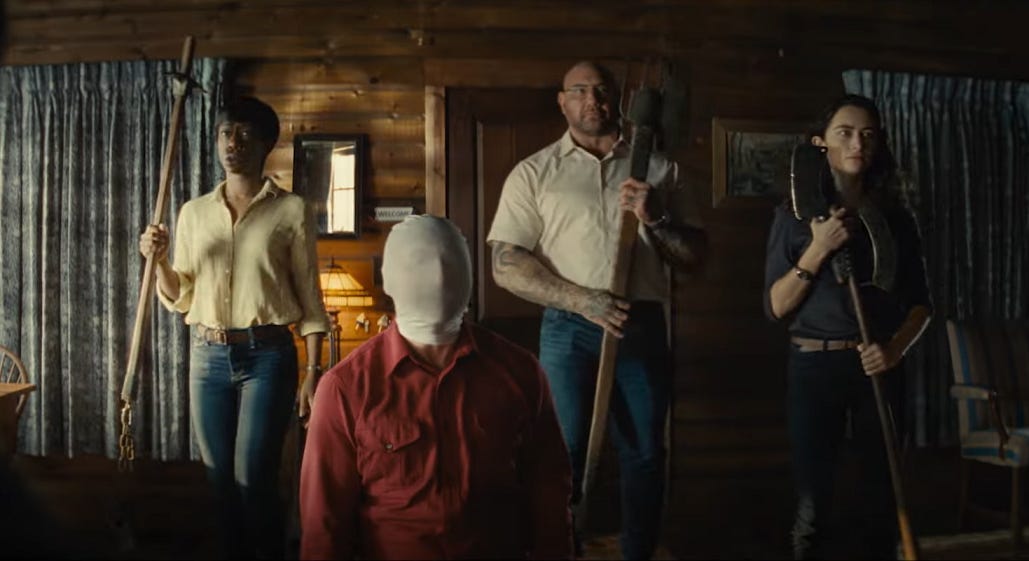The Rethinking of Ending Things: On the Final Act of 'Knock at the Cabin'
The latest from M. Night Shyamalan radically reworks the conclusion of its source material. But the change can't really be called a happy ending.
I understood going into Knock at the Cabin that M. Night Shyamalan’s latest movie would not be a faithful adaptation of its source material, Paul Tremblay’s 2018 novel The Cabin at the End of the World. Even before reviews of the film confirmed major changes, having read the novel I knew its ending would be impossible for any movie to keep, or at least any movie that wanted to avoid, in Scott’s words, “a CinemaScore somewhere between ‘F’ and a full-scale riot at the multiplex.” What I didn’t know was just how unfaithful it would be. The home stretch of Shyamalan’s film, which the director scripted with the team of Steve Desmond and Michael Sherman, essentially turns the thematic conclusions of Tremblay’s novel on their head. A novel that ends with an act of defiance against an all-powerful but unjust God has been transformed into a story about the kind of faith that means trusting in divine providence even to the point of death. I left the film feeling a little queasy at the changes. But that queasiness has started to settle the more I’ve thought about the film. (What follows will, as you might have guessed already, get into spoiler territory.)
Friend of The Reveal Tasha Robinson offers an excellent detailed account of the changes over at Polygon, but here’s the thumbnail version: As Knock at the Cabin opens we see Wen (Kristen Cui), an almost-eight-year-old girl, gathering grasshoppers when she’s approached by Leonard (Dave Bautista), a hulking man with a tender demeanor. She warms to him, but when he’s joined by others wielding what appear to be homemade weapons she flees to her two fathers, Andrew (Ben Aldridge) and Eric (Jonathan Groff), with whom she’s vacationing at a remote cabin. In time, Leonard and his companions tell the family that there’s an apocalypse on the horizon, one that can only be averted if one of the three family members sacrifices another.
To this point, it stays close to Tremblay’s novel, and continues to do so for a while. But where The Cabin at the End of the World hinges on a shocking mid-story development — Wen’s accidental death as the result of a scuffle between Leonard and Andrew — Shyamalan’s veers off toward a much different sort of conclusion. Where the first half of the novel is an exercise in sustained ambiguity, with evidence suggesting that the invaders are right, however crazy-seeming their beliefs, balanced against the possibility the TV news reports of mounting catastrophes might just be coincidental (or somehow faked), that possibility has all but evaporated in the final chapters, as evidence mounts that, yes, the world really is ending and God demands blood to call off armageddon. The novel ends with Andrew and Eric refusing to commit to a sacrifice as a kind of rebuke to God. Yes, this may be how the universe works and what God wants. But it’s unfair and they refuse to go along with it.
Shyamalan’s film, by contrast, keeps Wen alive and lets another character offer himself up to save the world. As in the novel, Eric and Andrew hold different views on God. Andrew’s a skeptic andEric’s a believer, the one who thinks he may actually have had a vision that coincides with their invaders’ beliefs. The victim of a homophobic attack, Andrew is also quick to anger and slow to forgive. He’s a man who might let a world that’s wronged him burn so long as his family survives. Eric is not that sort of man and, as a storm crashes and planes fall from the sky, Andrew kills his husband at Eric’s insistence, inspired by Eric’s optimistic description of the future Andrew and their daughter will have together, one that will only be possible with his death. And, after a short stretch where it looks like the film will end on a moment that will just have taken a different route to end at the same ambiguity as Tremblay’s novel, the film essentially confirms his choice by letting the apocalypse lift.
In some respects, it’s a perversion of Tremblay’s novel, which, like much of his work, follows a dark premise to a grim but seemingly inevitable conclusion. The Cabin at the World has an apocalyptic precedent in Michael Tolkin’s 1991 film The Rapture, in which Mimi Rogers plays Sharon, a hedonist-turned-born again Christian. Her faith leads her to commit an horrific act that seemingly ushers in the Rapture, which plays out almost exactly as described in the biblical Book of Revelation. The fundamentalists got it right, apparently, but disillusioned and feeling that any God that would demand her to do what she’s done isn’t worth obeying, Sharon refuses Heaven. The film ends, stunningly, on a character delivering a full-throated “non serviam” that acknowledges the existence of God but deems God unworthy of worship on moral grounds.
A direct adaptation of Tremblay’s novel would have ended much the same way and, at first, I thought of Knock at the Cabin as Shyamalan’s attempt to do for The Cabin at the End of the World what Barry Levinson’s 1984 film The Natural did with Bernard Malamud’s novel of the same name: sell out its dark ending, and in the process its core themes, in the service of a crowd-pleasing (but undeniably effective) ending. (And, based on a screenplay review site’s summary of the original script, the final act seems to be Shyamalan’s primary addition.) But it’s not quite that simple. Shyamalan doesn’t water down the source material with this adaptation. He makes it his own.
Knock’s final scenes might be more hopeful than the ending of Tremblay’s novel, but it’s hard to call it a happy ending. The apocalypse lifts and Andrew and Wen can apparently still head toward the happy life together Eric envisioned. But what kind of God would demand this? Ultimately, the ending lands somewhere between Robert Redford delivering a homer so powerful it shatters the stadium’s light and the heavenly bell tolling in approval at the end of Breaking the Waves after Emily Watson’s Bess sacrifices herself. It may be what God wants. But what does that say about God?
Shyamalan has a history of steering his films toward hope, but of late it’s been a hard-won sort of hope. (The ultimate fate of the surviving characters in Old, for instance, finds them alive but facing an unbelievably fucked up future.) In his review of Knock for Vulture, Bilge Ebiri notes that the director’s fondness for a “decidedly earnest (and audience-friendly) form of humanity” and Eric’s sacrifice is depicted as humanity at its best, a willingness to, like Christ, give everything up for the greater good. Shyamalan depicts his choice as noble, but the film surrounding that moment keeps sounding notes of skepticism. In the diner, where Andrew and Wen join other survivors, there’s a sense of relief but not peace. In the car, the sound of a song K.C. and the Sunshine Band that Eric, Wen, and Andrew listened to in happier times plays less like a confirmation of their choice than a reminder of all they’ve lost.
Yet Knock doesn’t demand viewers take a side and see Eric’s choice as an act of faith or the grotesque demand of a God not worthy of Eric’s death. Instead it chooses never fully to release the tension between those two possibilities. Shyamalan may redirect Tremblay’s story, but its final destination is unsettling in its own way. The world doesn’t burn. The family, though reduced, lives on. But whatever stability they find in the aftermath of disaster could be shattered at any moment. They’ll live the rest of their lives listening for the next knock.







I love some of Shyamalan's movies, but he's the last person I'd hire to direct something heavy on ambiguity, and the last person I'd hire to direct something heavy on theme. For me, "Cabin at the End of the World" is fundamentally about modern anxieties around how much access to information we have and how apocalyptic that makes everything feel---how apocalyptic everything is designed to feel by people who can make money from making people think the world is ending. It's secondarily about (as Scott Renshaw discusses in his excellent review) the uneasy status of being gay in 2022 and being told by reasonable, polite people that, no, you have to sacrifice your family because of our religion. I bet if you asked Shyamalan what this story is "about", he'd say, "Oh, it's about these people in this cabin and then there's a home invasion and then the ending wasn't that cool, but then I made a cool ending." He simply doesn't operate on the level of theme. He operates on the level of, "How can I make this ending cool?"
And I'm not someone who nitpicks about whether an actor looks like his character, generally. I hate that. But so much of this story's heft comes from the fact that Leonard is "twenty-four and a half"---that he's young and immature enough to describe himself that way, and that he's nonetheless the leader of this group. The naivete of these characters is the point. Casting a professional wrestler in his mid-fifties for that role was such a Shyamalan decision - because, hey, it says the guy is big in the book, and what's more faithful to the book than casting a big guy?
Also, "Knock at the Cabin" is a weird and nonsensical title and it bugs me a lot.
To me Knock’s ending felt like an expansion of Signs’ overt theism, to the point where they might as well inhabit the same fictional universe. It’s a universe in which the Abrahamic God is a literal entity, alternately capricious, tricky, and cruel. This being is never interrogated, either for the justice of its actions or its right to perform them. It is correct to worship it and at the end of the day it has your best interests at heart, despite all evidence to the contrary.
I haven’t read Tremblay’s novel, but the ending outlined here seems like a much more natural one, and also much more hopeful. Capitulating to an invisible cosmic monster by killing the love of your life seems to me the much harsher bummer.